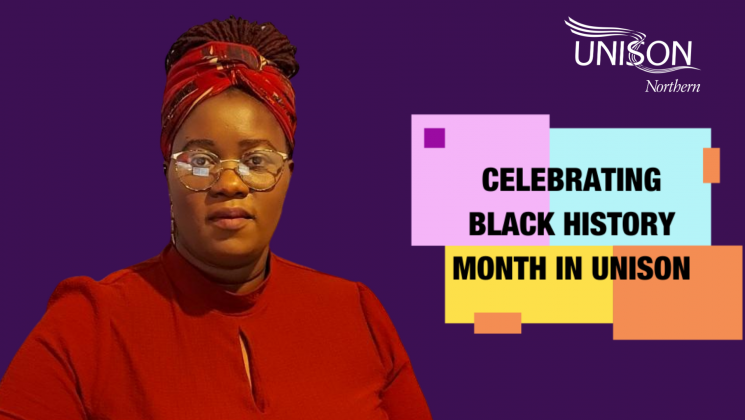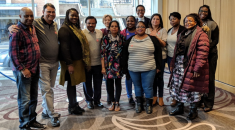Introduction by Clare Williams, UNISON Northern Regional Secretary.
October is Black History Month – where we celebrate how Black people and communities have shaped our history.
This year black workers have faced higher risks from COVID-19 working on the frontline, often in low paid jobs with little recognition. We have organised for risk assessments for black workers and calling upon employers to provide vital PPE or organise different ways of working such as working from home or moving workers to low risk areas.
UNISON has and always will work to challenge racism. Working with organisations like Show Racism The Red Card, we take our anti racism work beyond the trade union movement.
We have content planned throughout the month on our social media, which I hope you enjoy.
I am really pleased to hand over to the chair of our Black Members Self Organised Group, Mavreen Ncube for the rest of this post.
Clare Williams
Hi my name is Mavreen Ncube and I am the Chair of our Regional Black Member self-organised Group covering the Northern Region
I am writing this guest blog so that I can talk to all of you about what Black History Month means to me and why it is so important to educated people about black history in the UK and the work UNISON does with our partners at Show Racism the Red Card within our branches and workplaces across the region to tackle discrimination and to embed equality.
Black History Month is important now more than ever before, especially in the recent light of the Black Lives Matter movement. Celebrating black history was envisioned as a way to counter the invisibility of black people and to challenge the negative imagery and stereotypes that were often the only manner black people were depicted in popular culture and in the media.
Black History Month also celebrates the fact that black people have been in Britain for a lot longer than previously thought and have continued to contribute to the British economy and society, in a number of ways in our National Health Service, our schools or in local government, to name a few sectors black employees occupy.
For me Black History Month is an opportunity for me to celebrate my heritage and to remember our Great Black Heroes who paved a way for us. It’s also an opportunity for us black people to showcase our many achievements and talents.
Why is education about black history important? Firstly, it exists to help inspire and instil pride of self and of community among young black people; and to help the UK confront the problem of racial discrimination through greater understanding, by making black past accessible and meaningful to the broader white community. Secondly, educating those outside the black community about black history would help people understand the contributions and sacrifices made by black people in the past and present. Focusing on these contributions and sacrifices would help in challenging discrimination and racism.
Our black self-organisation is an important part of the fight against racism, discrimination and injustice in our society and should be everyone’s concern. As a nation we should raise awareness regarding these ongoing issues. Although we have come a long way, we should continue to reflect on our attitudes, behaviour and unconscious bias.
In the UK there are still issues of discrimination and racism. Black people are disproportionately affected by inequalities that exist in the UK. We need to call for a fairer society for all. Unison strives to create an environment that nurtures equality while fighting against discrimination and Injustice. The work we do with our activists and Show Racism the Red Card aims to give people of colour a voice, to share their views and experiences, with an aim of providing a platform for positive change to occur.
Let us Be the change that we want to see, we need to create a world that is fair for all. A world that celebrates our differences, a world free from discrimination and racism.


